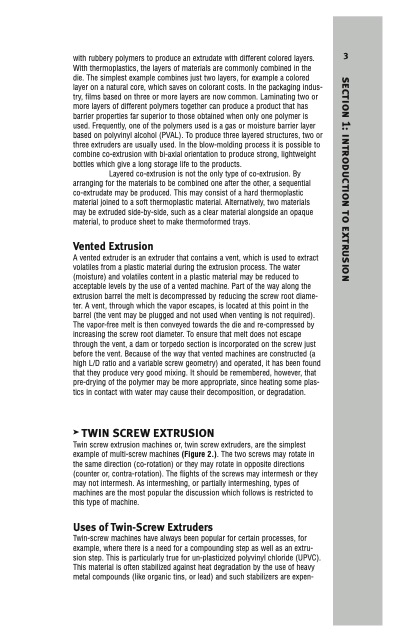
PDF Publication Title:
Text from PDF Page: 009
with rubbery polymers to produce an extrudate with different colored layers. With thermoplastics, the layers of materials are commonly combined in the die. The simplest example combines just two layers, for example a colored layer on a natural core, which saves on colorant costs. In the packaging indus- try, films based on three or more layers are now common. Laminating two or more layers of different polymers together can produce a product that has barrier properties far superior to those obtained when only one polymer is used. Frequently, one of the polymers used is a gas or moisture barrier layer based on polyvinyl alcohol (PVAL). To produce three layered structures, two or three extruders are usually used. In the blow-molding process it is possible to combine co-extrusion with bi-axial orientation to produce strong, lightweight bottles which give a long storage life to the products. Layered co-extrusion is not the only type of co-extrusion. By arranging for the materials to be combined one after the other, a sequential co-extrudate may be produced. This may consist of a hard thermoplastic material joined to a soft thermoplastic material. Alternatively, two materials may be extruded side-by-side, such as a clear material alongside an opaque material, to produce sheet to make thermoformed trays. Vented Extrusion A vented extruder is an extruder that contains a vent, which is used to extract volatiles from a plastic material during the extrusion process. The water (moisture) and volatiles content in a plastic material may be reduced to acceptable levels by the use of a vented machine. Part of the way along the extrusion barrel the melt is decompressed by reducing the screw root diame- ter. A vent, through which the vapor escapes, is located at this point in the barrel (the vent may be plugged and not used when venting is not required). The vapor-free melt is then conveyed towards the die and re-compressed by increasing the screw root diameter. To ensure that melt does not escape through the vent, a dam or torpedo section is incorporated on the screw just before the vent. Because of the way that vented machines are constructed (a high L/D ratio and a variable screw geometry) and operated, it has been found that they produce very good mixing. It should be remembered, however, that pre-drying of the polymer may be more appropriate, since heating some plas- tics in contact with water may cause their decomposition, or degradation. ➤ TWIN SCREW EXTRUSION Twin screw extrusion machines or, twin screw extruders, are the simplest example of multi-screw machines (Figure 2.). The two screws may rotate in the same direction (co-rotation) or they may rotate in opposite directions (counter or, contra-rotation). The flights of the screws may intermesh or they may not intermesh. As intermeshing, or partially intermeshing, types of machines are the most popular the discussion which follows is restricted to this type of machine. Uses of Twin-Screw Extruders Twin-screw machines have always been popular for certain processes, for example, where there is a need for a compounding step as well as an extru- sion step. This is particularly true for un-plasticized polyvinyl chloride (UPVC). This material is often stabilized against heat degradation by the use of heavy metal compounds (like organic tins, or lead) and such stabilizers are expen- 3 section 1: introduction to extrusionPDF Image | Dynisco Extrusion Processors Handbook

PDF Search Title:
Dynisco Extrusion Processors HandbookOriginal File Name Searched:
27429_Legacy_Txt.pdfDIY PDF Search: Google It | Yahoo | Bing
Development of a solar powered Electric Ship The Electricship website originally started off as a project to develop a comprehensive renewable, affordable, modular electric ship... More Info
Modular Boat Hull Composite The case for a unsinkable, modular composite hybrid boat hull... More Info
MS Burgenstock Hybrid Electric Catamaran Lake Lucerne Unique shuttle servicing Lucerne to the Burgenstock Resort... More Info
Ground Power Unit GPU Powered by Lithium Ion Batteries The goal of the Ground Power Unit is to provide a readily accessible, modular, ready-to-power solution for remote power... More Info
| CONTACT TEL: 608-238-6001 Email: greg@electricship.com | RSS | AMP |